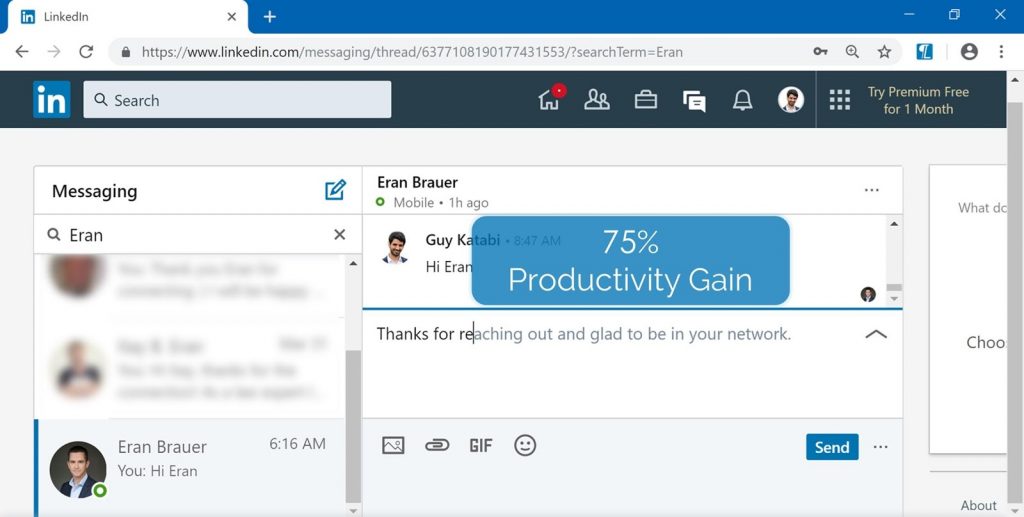From text prediction to grammar check, the applications of AI and ML are fast changing. Lightkey Sources is an Israeli-based startup that is relatively younger in the field. Founded in 2016 by Guy Katabi and Eran Brauer, the startup’s AI-powered predictive typing and text prediction software is compatible with MS Office and Chrome and supports 80 prediction languages, including Hindi, thus helping it adding scores of Indians to its international user base.
“Lightkey is an AI-Powered predictive typing software for Windows PCs. Lightkey seamlessly integrates with Word, Outlook and PowerPoint (as well as other applications) and offers online predictive typing experience in more than 80 languages,” Katabi, the Co-founder of the startup explains
Lightsey’s underlying prediction technology utilises a wide spectrum of machine learning techniques to offer contextual predictions of up to 12 words ahead, including punctuation marks, as well as spelling corrections. All these nuanced aspects drive personalisation for each user, as AI and ML play a crucial role in developing a deep understanding of the users’ contents.
Thus, by enabling text-prediction and succinct grammar checks, the software helps its users to write faster and resolves the issue of writer’s block, considered to be one ubiquitous problem faced by writers across the world.
“In a broader sense, while people are capable of forming thoughts at a rate of over 1,000 words per minute, they type at approximately 40 words per minute. It’s like our brain is sitting in traffic a few hours a day while trying to transform thoughts into written text. Lightkey is about beating the traffic. It’s like taking the highway. Our vision is to make typing possible at the speed of your mind,” Katabi explains.
Competition is driving innovation
In the market presently, there is no dearth of software that offers similar services. Over the last decade, due to advancements in the field of AI, ML and NLP, the number of solutions related to text-prediction and analysis have grown substantially.
One such similar product is Gmail Smart Compose, which was introduced by Google in 2018 to help Gmail users type fast and reduce their time for their users. However, one of the biggest drawbacks with the features is that it requires an internet connection and cannot work offline. Another problem is that the email-related content is only available in English. This is a major set back considering that only 20 per cent of the total world population speaks English.
Hence, the need for regional solutions has prompted players like Lightkey Sources to think out of the box to find a feasible and secure solution. As a result, the duo has made the software available for offline uses, in multiple languages and it is not particularly limited to just email composing
“Lightkey doesn’t require an internet connection, it supports over 80 languages and most importantly it supports predictive typing in a wide variety of domains. In other words, Lightkey’s predictions are available and accurate whether you write a research paper, a legal document, a sales presentation, and basically any kind of content ranging from everyday emails to highly domain-specific content,” Katabi point out.
Furthermore, in terms of privacy, Lightkey never saves its user’s content to its cloud, hence bringing in an element of security,
Prediction Engine as the backbone
The central layer in Lightkey’s stack is the core prediction engine, which learns the user’s typing patterns in different contexts and uses multiple language models and various machine learning techniques to decide what is the most relevant prediction to offer.
Aside from predictions relevance and accuracy, Lightkey’s engine is optimised for high performance. Lightkey completes its algorithmic decision-making process and offers predictions in under 10 milliseconds.
The next layer in their stack is a prediction technology dedicated to the corporate and business sectors. Behind the scenes, Lightkey uses intelligent collaboration methods to share typing patterns across the organization. In addition, the business edition enables organizations previously untapped access to key productivity-related performance indicators, both in an individual and group/ organisational levels.
“The last (and hidden layer) in our stack is the prediction lab. Our lab evaluates millions of prediction samples in different domains and enables us to fine tune Lightkey’s prediction engine accordingly,” Katabi says.
The road ahead
Going forward, the startup aims to incorporate a number of groundbreaking innovations into their tool-kit, one of their primary goals is to help its users to express their thoughts at the native speed in which they’re formed. “Our future plans include machine-learning related developments that will push the boundaries of predictive typing without taking away creativity and privacy. In addition, we are planning to expand Lightkey to additional platforms, starting with MacOS,” Katabi concludes.


























